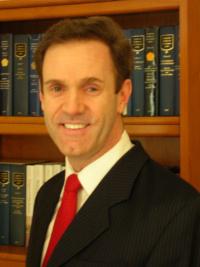 Dr. Samuel Gregg is director of research at the Acton Institute. He has written and spoken extensively on questions of political economy, economic history, ethics in finance, and natural law theory. He has authored several books including Becoming Europe: Economic Decline, Culture, and America’s Future, and most recently Tea Party Catholic. Dr. Gregg took some time out of his busy schedule to give a short exclusive interview for the Return to Order website blog.
Dr. Samuel Gregg is director of research at the Acton Institute. He has written and spoken extensively on questions of political economy, economic history, ethics in finance, and natural law theory. He has authored several books including Becoming Europe: Economic Decline, Culture, and America’s Future, and most recently Tea Party Catholic. Dr. Gregg took some time out of his busy schedule to give a short exclusive interview for the Return to Order website blog.
John Horvat: I have had the great pleasure of reading several of your books on economics. I suppose my first question is: how did you end up in the middle of the “dismal science?”
Is Technology Ruining Your Life? Take A Quick Quiz To Find Out By Clicking Here.
Dr. Gregg: I did some economic history as an undergraduate and for my graduate study, but it was really through studying natural law philosophy when doing my doctorate that I came to enter into some of the deeper background questions about the strengths and weaknesses of economics and economies. I was also very interested in the relationship between economics and culture – the latter being understood as the choices, beliefs, actions, values, and institutions that shape a society, including its economic arrangements. The mathematical dimension of economics has its place, but also some rather important limits, and shouldn’t be given more significance than it otherwise warrants. In that regard, I found the work of Wilhelm Röpke – the German economist who was one of the architects of the German economic miracle after 1945 – especially instructive. I wrote a book about Röpke in which I tried to describe the type of political economy that Röpke sought to promote in order to try and ensure the growth of forms of economic life undergirded by defensible moral commitments. Not only was he a fierce critic of Keynes, Keynesianism and the welfare state, but Röpke also understood that the critique of such thinkers, thought and forms of political economy had to be as much moral as economic. Röpke was equally comfortable talking about the finer points of monetary theory as he was with discussing theologians like Aquinas or historians such as Thucydides. We need more people like that discussing, thinking and writing about economic subjects.
John Horvat: In your book, Becoming Europe, you make the connection between economics and culture, and also what you call “economic culture.” Why are these connections so important?
Dr. Gregg: Many economists make the mistake of thinking that economics is a more-or-less self-sufficient discipline. But economies are part of a wider set of values and institutions (what I call culture), and can’t be understood outside these realities. Economics that is not attentive to these realities ends up in a type of echo-chamber. Just look at most economics journals: they are full of algebra! It’s part of the scientism mentality – the mistake of thinking that the only way we can know truth is through empirical and positivist methods, and that the only truth that can be known is that which is measurable. Well, reason isn’t measurable, but does anyone doubt it exists?
In any event, the more I studied economic subjects, the more convinced I became that while economic factors such as incentives matter in explaining why some economies prosper and others don’t, it’s culture that drives history, societies and economic life. If you want to know why, for instance, Australia and Argentina started the twentieth century as among the wealthiest nations on the planet (in terms of GDP per capita), and why Australia is still an economic success while Argentina is now an economic disaster, it’s not just the result of good and bad economic policies. It’s also about the differing economic cultures that have prevailed in these societies.
John Horvat: On the other side of the spectrum, the leftist French economist Thomas Piketty who just wrote the bestselling book, Capital in the Twenty-First Century, makes a similar claim that social sciences are important to economics. How does your view differ from his?
Dr. Gregg: I’m not so sure that Piketty is as interested in the relevance of social sciences to economics as some imagine. In terms of values, his book seems quite fixated with one value: equality, and not so much equality in dignity, but equality as sameness. To tell you the truth, I really don’t understand the fuss. His prescriptions for tackling our problems are essentially old-fashioned social democracy. Piketty is an accomplished economist and his argument has certainly provoked plenty of debates, but it’s unclear to me that he’s doing anything that’s even close to the great work that has been done by outstanding institutional economists such as Douglass North and Edmund Phelps.
John Horvat: I notice that you often quote Saint Thomas Aquinas. How relevant is he to the economic issues being debated today?
Dr. Gregg: Aquinas , I often say, is relevant to every question! But his relevance, I would argue, to economics, economic policy, economic institutions and economic culture is his analysis of human choice and human action and the way it affects the chooser as well as the society in which the chooser lives. Moreover, Aquinas actually believes in free will. And we need to keep in mind that most people today in the academy don’t. They’re basically soft-determinists or hard-determinists. It’s very hard to find people who believe in free will – in the fullest sense of the term – outside the ranks of orthodox (small “o”) Christians and Jews as well as natural law circles. That confidence in the truth of free will makes every difference in the world – including in the way we think about economics.
John Horvat: To what extent are we “becoming Europe” economically today? What are the prospects for the future?
Dr. Gregg: Parts of America are already Europe: witness the states of California, New York and Illinois. There are aspects of what Alexis de Tocqueville called soft despotism – which is a major cause of Western Europe’s problems – in the American body-politic. That said, I think that America retains a capacity to reverse this trend, not least of all because of the principles of the Founding Fathers that serve as a standard for us to judge whether America is being faithful or not to those principles. The further down the path of soft despotism America goes, the harder it will be to reverse direction. But it isn’t impossible.
John Horvat: What would you say is the greatest threat to the American economy today?
Dr. Gregg: There are many threats, but perhaps the most significant is an  apparent unwillingness on the part of much of the citizenry to face up to some of the enormous economic challenges facing the United States. Many Americans will talk about the need to reduce, for instance, subsidies – until it comes to the congressional seat or senate seat in which they just happen to live! Until enough American citizens are willing to think about, but also act upon, these broader problems, most politicians won’t do anything. There are exceptions to that rule about political leaders – but not many, especially in democratic systems.
apparent unwillingness on the part of much of the citizenry to face up to some of the enormous economic challenges facing the United States. Many Americans will talk about the need to reduce, for instance, subsidies – until it comes to the congressional seat or senate seat in which they just happen to live! Until enough American citizens are willing to think about, but also act upon, these broader problems, most politicians won’t do anything. There are exceptions to that rule about political leaders – but not many, especially in democratic systems.
Related Articles: We Must Resist the Temptation to Secession


